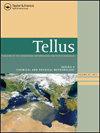Climate change feedback on the future oceanic CO2 uptake
IF 4.3
4区 地球科学
Q3 METEOROLOGY & ATMOSPHERIC SCIENCES
Tellus Series B-Chemical and Physical Meteorology
Pub Date : 1999-07-01
DOI:10.3402/TELLUSB.V51I3.16472
引用次数: 207
Abstract
Output from a coupled atmosphere–ocean model forced by the IS92a greenhouse gas scenario was used to investigate the feedback between climate change and the oceanic uptake of CO 2 . To improve the climate simulation, we used Gent and co-workers eddy parameterization in the ocean and a prognostic equation for export production from the upper ocean. For the period of 1850 to 2100, the change in the oceanic uptake of CO 2 with climate was separated into 3 feedbacks. (i) Climate change warmed the sea-surface temperature which increased the partial pressure of CO 2 in the surface ocean and reduced the accumulated ocean uptake by 48 Gt C. (ii) Climate change reduced meridional overturning and convective mixing and increased density stratification in high latitudes which slowed the transport of anthropogenic CO 2 into the ocean interior and reduced the cumulative ocean CO 2 uptake by 41 Gt C. (iii) Climate change altered “natural” cycling of carbon in the ocean which increased the cumulative ocean CO 2 uptake by 33 Gt C. The change in natural carbon cycling with climate change was dominated by 2 opposing factors. First, the supply of nutrients to the upper ocean decreased which reduced the export of organic matter (by 15% by year 2100) and produced a net CO 2 flux out of the ocean. However, associated with the reduced nutrient supply was the reduction in the supply of dissolved inorganic carbon to the upper ocean, which produced net CO 2 flux into the ocean. For our model, the latter effect dominated. By the year 2100, the combinations of these 3 climate change feedbacks resulted in a decrease in the cumulative oceanic CO 2 uptake of 56 Gt C or 14% of the 402 Gt C of oceanic CO 2 uptake predicted by a run with no climate change. Our total reduction in oceanic CO 2 uptake with climate change for the 1850 to 2100 period was similar to the 58 Gt C reduction in oceanic CO 2 uptake predicted by Sarmiento and Le Quere. However, our consistency with this previous estimate is misleading. By including the Gent and co-workers eddy parameterization in the ocean, we reduced the positive feedback between climate change and the oceanic uptake of CO 2 from 169 to 89 Gt C (80 Gt C change). This reduction reflects a decrease in both sea surface warming and anthropogenic forcing feedbacks. By using a prognostic parameterization of export production, we reduced the negative feedback response of the natural carbon cycle to climate change from 111 to 33 Gt C (78 Gt C). These 2 large offsetting changes in the ocean response to climate change produced only a net change of 2 Gt C. This resulted in a net reduction in oceanic uptake of 2 Gt C from the previous study. DOI: 10.1034/j.1600-0889.1999.t01-1-00012.x气候变化对未来海洋二氧化碳吸收的反馈
利用IS92a温室气体情景强迫的大气-海洋耦合模式的输出,研究了气候变化与海洋吸收co2之间的反馈关系。为了改进气候模拟,我们使用了Gent和同事的海洋涡旋参数化和上层海洋出口产品的预测方程。1850 ~ 2100年,海洋吸收co2随气候变化的变化可分为3个反馈。气候变化(i)温暖的海洋表面温度增加CO 2的分压在海洋表面和海洋吸收积累减少了48 Gt c(2)气候变化减少经向翻转和对流混合和增加密度分层在高纬度地区,减缓了交通的人为CO 2海洋内部和累积海洋CO 2吸收减少了41 Gt c(3)气候变化改变了海洋中“自然”的碳循环自然碳循环随气候变化的变化由两个相反的因素主导。首先,上层海洋的营养物供应减少,减少了有机物的输出(到2100年减少15%),并产生了海洋的二氧化碳净通量。然而,与营养供应减少相关的是向上层海洋提供的溶解无机碳减少,这产生了进入海洋的CO 2净通量。对于我们的模型,后一种效应占主导地位。到2100年,这3种气候变化反馈的组合导致累积海洋CO 2吸收减少56 Gt C,或在没有气候变化的运行中预测的海洋CO 2吸收402 Gt C的14%。1850年至2100年期间,随着气候变化,海洋二氧化碳吸收量减少的总量与sammiento和Le Quere预测的海洋二氧化碳吸收量减少58亿吨相似。然而,我们与先前估计的一致性是有误导性的。通过在海洋中加入Gent及其同事的涡旋参数化,我们将气候变化与海洋吸收CO 2之间的正反馈从169 Gt C减少到89 Gt C (80 Gt C变化)。这种减少反映了海面变暖和人为强迫反馈的减少。通过使用出口生产的预测参数化,我们将自然碳循环对气候变化的负反馈响应从111 Gt C减少到33 Gt C (78 Gt C)。海洋对气候变化响应的这两个大的抵消变化只产生了2 Gt C的净变化,这导致海洋吸收的碳比以前的研究减少了2 Gt C。DOI: 10.1034 / j.1600 0889.1999.t01 - 1 - 00012. x
本文章由计算机程序翻译,如有差异,请以英文原文为准。
求助全文
约1分钟内获得全文
求助全文
来源期刊
自引率
0.00%
发文量
3
期刊介绍:
Tellus B: Chemical and Physical Meteorology along with its sister journal Tellus A: Dynamic Meteorology and Oceanography, are the international, peer-reviewed journals of the International Meteorological Institute in Stockholm, an independent non-for-profit body integrated into the Department of Meteorology at the Faculty of Sciences of Stockholm University, Sweden. Aiming to promote the exchange of knowledge about meteorology from across a range of scientific sub-disciplines, the two journals serve an international community of researchers, policy makers, managers, media and the general public.

 求助内容:
求助内容: 应助结果提醒方式:
应助结果提醒方式:


